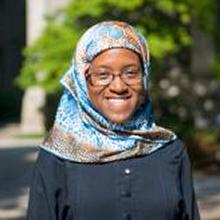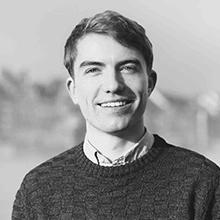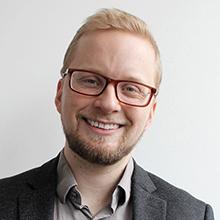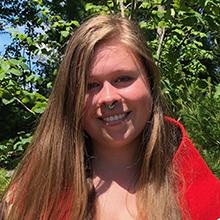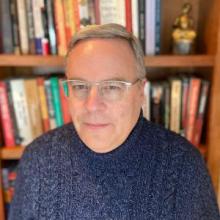First Year Scholars program introduces doctoral students to the many facets academic life
By Sarah Fister Gale
The first year in a PhD program can present many challenges as students learn to navigate an unfamiliar world, balancing studies and research with time spent finding mentors, building networks, and beginning to establish their place as a scholar.
Recognizing these realities, the Division of the Social Sciences launched a new initiative in Autumn Quarter 2020. Under the leadership of Mark Bradley, the Bernadotte E. Schmitt Distinguished Service Professor in the Department of History and Deputy Dean in the Division of the Social Sciences, and Chaevia Clendinen, Assistant Dean for Student Advancement and Diversity, the First Year Scholars program supports the early intellectual and professional development of first year doctoral students.
“We wanted to engage students early in their doctoral studies, to help them build an intellectual community and combat the stress that can occur in their first year,” Clendinen says.
Pandemic pilot
Originally planned to primarily engage students from under-represented communities, the onset of the COVID-19 pandemic and a shift to remote learning and research, the Division broadened the program to the entire cohort.
Thus, all first year doctoral students were invited to join the program, which included monthly virtual workshops, Zoom meetings, and socials with faculty and other doctoral students. Discussions ranged from health and wellness topics and how to find a mentor, to how to secure research grants and find collaboration partners from other departments.
Participation was always optional. Over the Autumn, Winter, and Spring Quarters, about half of the first year students participated in at least some of the events, and 30 showed up consistently.
“It seems extraordinary to have that level of participation, given the Zoom fatigue so many students face,” Bradley says.
“It was a good opportunity to meet other students and professors,” says Matthew Zipf, a first year doctoral students in the John U. Nef Committee on Social Thought. “It’s been very helpful.”
Jacy Reese Anthis, a first year sociology PhD student, says one of the best parts of the program was learning many of the “soft skills” that no one teaches you, like whether to refer to faculty by their first names, how to know whether a piece of research should be written as an article or a book, and what makes a good advisor.
Many participating students kept coming back because they saw value in engaging with faculty and senior doctoral students, who they wouldn’t otherwise encounter in a remote academic year.
“I didn’t grow up in academia, so it’s been a good way to get my feet wet,” he says.
“It’s been reassuring to know other students are experiencing the same things,” adds Sabena Allen, a first year anthropology doctoral student. Allen, like many first year students, hasn’t been on campus since visiting Chicago in 2019, and she’s found the virtual program to be a great way to build relationships with faculty and peers.
“Even though it is difficult to connect meaningfully via Zoom it’s been helpful,” Allen says.
Summer mentors
All participating students were invited to apply for a summer research grant, where both the students and their mentor will receive $2000 to support a research project of the student’s design. The key to the grant program is that applicants have to find their own mentor. “Mentoring doesn’t always happen in the first year,” Bradley says. “This gave students a reason to start those conversations with faculty.”
Fourteen students from across social science disciplines were awarded funding for Summer 2021.
Zipf leveraged the grant program to further engage with Alison LaCroix, the Robert Newton Reid Professor of Law at the University of Chicago Law School and an Associate Member of the Department of History.
Zipf’s project will involve a law and literature review exploring 20th-century narratives around abortion in the United States.
“(LaCroix) is a phenomenal scholar and one of the few professors in the law school who knows all the literature for this project,” Zipf says. He had already taken her class on U.S. Legal History 1800–70. The First Year Scholars Program gave him a reason to connect outside the scope of her course. “It’s useful to have this structure as an excuse to reach out.”
Athins used the research grant to connect with James Evans, Professor in the Department of Sociology and Director of the Knowledge Lab. Evans agreed to mentor him as he researches the varying frames within which artificial intelligence is presented. “James is a big part of why I chose UChicago for grad school,” Anthis says.
Foundation for future research
Bradley and Clendinen hope the summer program will help students build mentor relationships that will last throughout their academic experience. They note that many students are doing projects that are likely to inspire their second year work and beyond.
For example, Allen plans to study digital museum archives of Tlingit culture, which aligns with her long term interests in studying this Indigenous culture of her native Alaska.
“The decision to study online archives was driven by the pandemic,” she says. But she believes it holds a lot of potential for exploring the balance between access and secrecy around native objects and knowledge that are often held by museums.
Her mentor, Teresa Montoya, Assistant Professor of Anthropology and a scholar in Museum Studies and Indigenous Studies was eager to support the research. “She was very enthusiastic,” Allen says. “Without this project I would not have been able to work with her over the summer.”
Future Firsts
The Division will continue the program next year in-person, adjusting as needed given the return to in-person research and teaching.
They also plan to bring back many of the students who participated this year to speak to the next cohort and serve as peer mentors.
“This year’s program has had some terrific outcomes given the virtual environment,” Bradley says. “But we will be happy when we can all be face-to-face once again.”
 THE UNIVERSITY OF CHICAGO
THE UNIVERSITY OF CHICAGO


